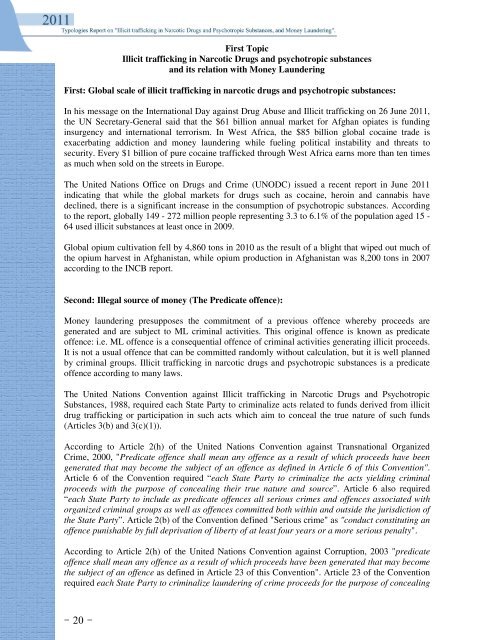Illicit Trafficking in Narcotic Drugs and Psychotropic ... - menafatf
Illicit Trafficking in Narcotic Drugs and Psychotropic ... - menafatf
Illicit Trafficking in Narcotic Drugs and Psychotropic ... - menafatf
Create successful ePaper yourself
Turn your PDF publications into a flip-book with our unique Google optimized e-Paper software.
- 20 -<br />
First Topic<br />
<strong>Illicit</strong> traffick<strong>in</strong>g <strong>in</strong> <strong>Narcotic</strong> <strong>Drugs</strong> <strong>and</strong> psychotropic substances<br />
<strong>and</strong> its relation with Money Launder<strong>in</strong>g<br />
First: Global scale of illicit traffick<strong>in</strong>g <strong>in</strong> narcotic drugs <strong>and</strong> psychotropic substances:<br />
In his message on the International Day aga<strong>in</strong>st Drug Abuse <strong>and</strong> <strong>Illicit</strong> traffick<strong>in</strong>g on 26 June 2011,<br />
the UN Secretary-General said that the $61 billion annual market for Afghan opiates is fund<strong>in</strong>g<br />
<strong>in</strong>surgency <strong>and</strong> <strong>in</strong>ternational terrorism. In West Africa, the $85 billion global coca<strong>in</strong>e trade is<br />
exacerbat<strong>in</strong>g addiction <strong>and</strong> money launder<strong>in</strong>g while fuel<strong>in</strong>g political <strong>in</strong>stability <strong>and</strong> threats to<br />
security. Every $1 billion of pure coca<strong>in</strong>e trafficked through West Africa earns more than ten times<br />
as much when sold on the streets <strong>in</strong> Europe.<br />
The United Nations Office on <strong>Drugs</strong> <strong>and</strong> Crime (UNODC) issued a recent report <strong>in</strong> June 2011<br />
<strong>in</strong>dicat<strong>in</strong>g that while the global markets for drugs such as coca<strong>in</strong>e, hero<strong>in</strong> <strong>and</strong> cannabis have<br />
decl<strong>in</strong>ed, there is a significant <strong>in</strong>crease <strong>in</strong> the consumption of psychotropic substances. Accord<strong>in</strong>g<br />
to the report, globally 149 - 272 million people represent<strong>in</strong>g 3.3 to 6.1% of the population aged 15 -<br />
64 used illicit substances at least once <strong>in</strong> 2009.<br />
Global opium cultivation fell by 4,860 tons <strong>in</strong> 2010 as the result of a blight that wiped out much of<br />
the opium harvest <strong>in</strong> Afghanistan, while opium production <strong>in</strong> Afghanistan was 8,200 tons <strong>in</strong> 2007<br />
accord<strong>in</strong>g to the INCB report.<br />
Second: Illegal source of money (The Predicate offence):<br />
Money launder<strong>in</strong>g presupposes the commitment of a previous offence whereby proceeds are<br />
generated <strong>and</strong> are subject to ML crim<strong>in</strong>al activities. This orig<strong>in</strong>al offence is known as predicate<br />
offence: i.e. ML offence is a consequential offence of crim<strong>in</strong>al activities generat<strong>in</strong>g illicit proceeds.<br />
It is not a usual offence that can be committed r<strong>and</strong>omly without calculation, but it is well planned<br />
by crim<strong>in</strong>al groups. <strong>Illicit</strong> traffick<strong>in</strong>g <strong>in</strong> narcotic drugs <strong>and</strong> psychotropic substances is a predicate<br />
offence accord<strong>in</strong>g to many laws.<br />
The United Nations Convention aga<strong>in</strong>st <strong>Illicit</strong> traffick<strong>in</strong>g <strong>in</strong> <strong>Narcotic</strong> <strong>Drugs</strong> <strong>and</strong> <strong>Psychotropic</strong><br />
Substances, 1988, required each State Party to crim<strong>in</strong>alize acts related to funds derived from illicit<br />
drug traffick<strong>in</strong>g or participation <strong>in</strong> such acts which aim to conceal the true nature of such funds<br />
(Articles 3(b) <strong>and</strong> 3(c)(1)).<br />
Accord<strong>in</strong>g to Article 2(h) of the United Nations Convention aga<strong>in</strong>st Transnational Organized<br />
Crime, 2000, "Predicate offence shall mean any offence as a result of which proceeds have been<br />
generated that may become the subject of an offence as def<strong>in</strong>ed <strong>in</strong> Article 6 of this Convention".<br />
Article 6 of the Convention required “each State Party to crim<strong>in</strong>alize the acts yield<strong>in</strong>g crim<strong>in</strong>al<br />
proceeds with the purpose of conceal<strong>in</strong>g their true nature <strong>and</strong> source”. Article 6 also required<br />
“each State Party to <strong>in</strong>clude as predicate offences all serious crimes <strong>and</strong> offences associated with<br />
organized crim<strong>in</strong>al groups as well as offences committed both with<strong>in</strong> <strong>and</strong> outside the jurisdiction of<br />
the State Party”. Article 2(b) of the Convention def<strong>in</strong>ed "Serious crime" as "conduct constitut<strong>in</strong>g an<br />
offence punishable by full deprivation of liberty of at least four years or a more serious penalty".<br />
Accord<strong>in</strong>g to Article 2(h) of the United Nations Convention aga<strong>in</strong>st Corruption, 2003 "predicate<br />
offence shall mean any offence as a result of which proceeds have been generated that may become<br />
the subject of an offence as def<strong>in</strong>ed <strong>in</strong> Article 23 of this Convention". Article 23 of the Convention<br />
required each State Party to crim<strong>in</strong>alize launder<strong>in</strong>g of crime proceeds for the purpose of conceal<strong>in</strong>g


